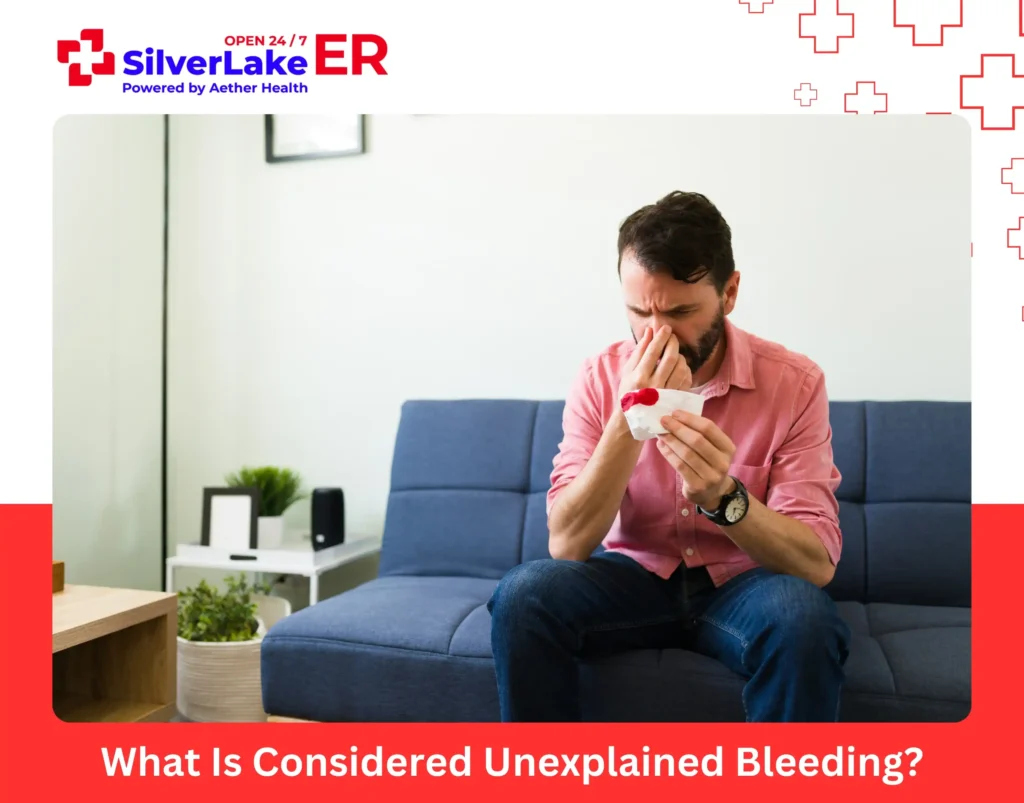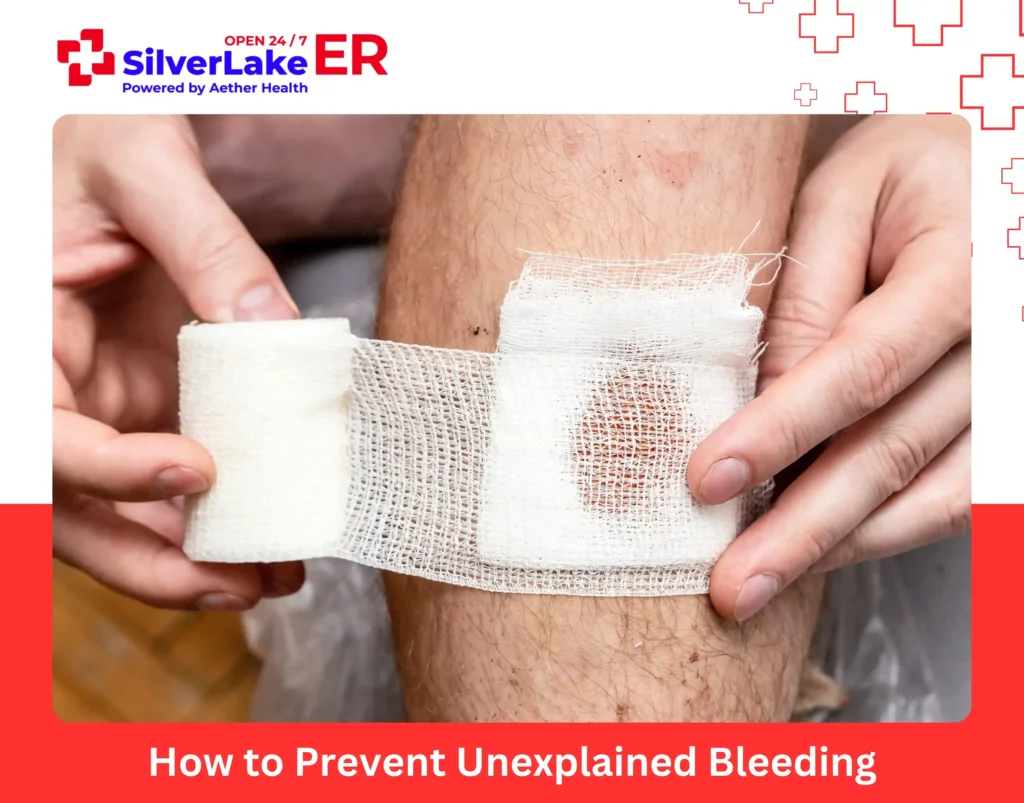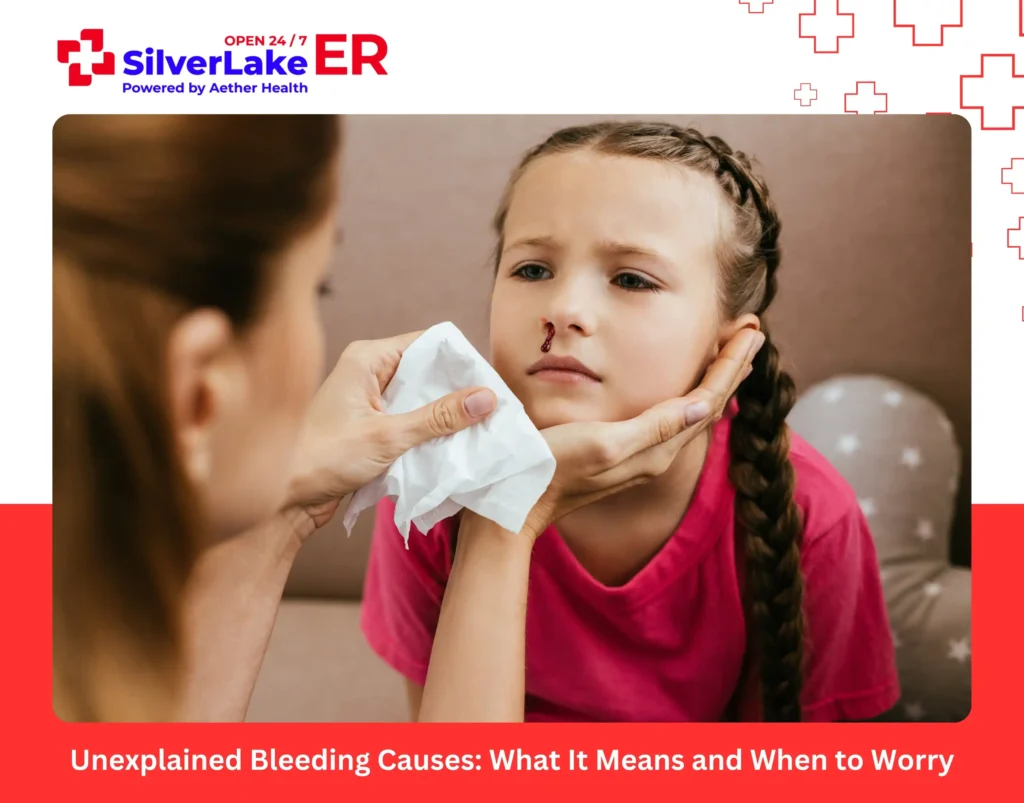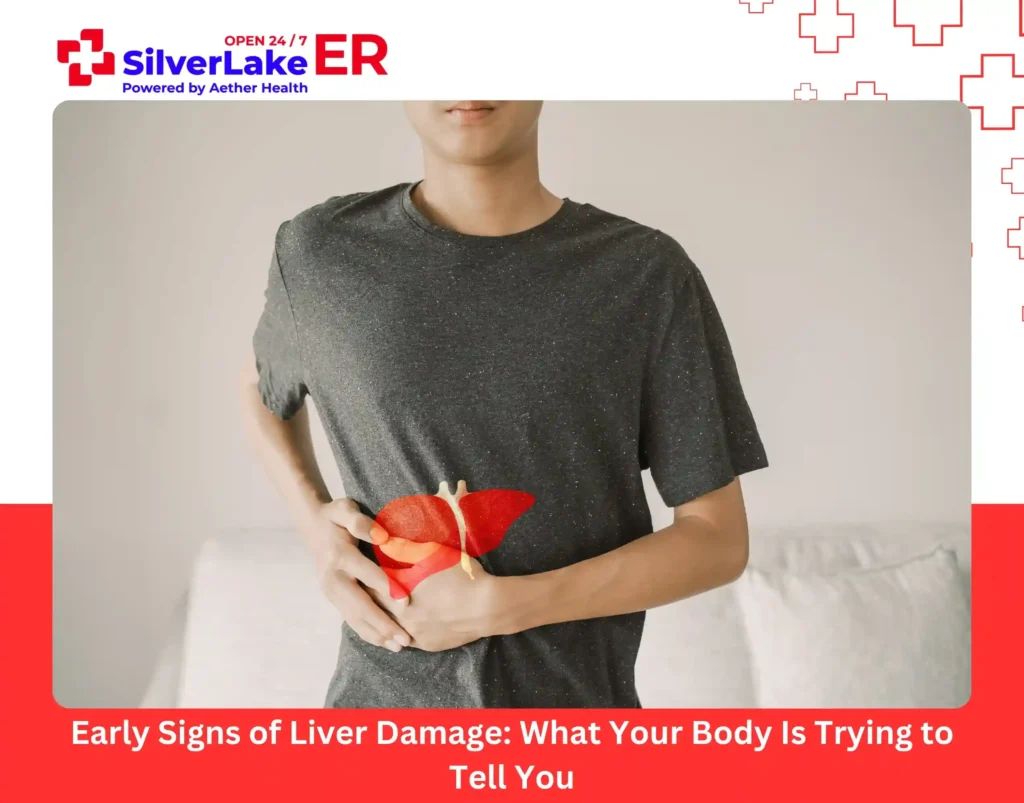The human body doesn’t bleed for no reason. While occasional mild bleeding may result from irritation or a minor injury, persistent or spontaneous bleeding could signal a hidden internal injury, a bleeding disorder, a ruptured organ, or an early-stage cancer.
The scary part? In many serious conditions, bleeding is the first and only warning sign before things get much worse. Understanding the unexplained bleeding causes helps you recognize early signs and know when to seek professional medical care.
This awareness can literally save your life.
What Is Considered Unexplained Bleeding?

“Unexplained bleeding” refers to any bleeding that occurs without a clear cause, such as trauma or surgery. It can appear externally (nosebleeds, skin bruises, gum bleeding) or internally (stomach, intestines, urinary tract, or reproductive organs).
Bleeding may also show up as:
- Frequent nosebleeds
- Easy bruising or small red/purple spots on the skin (petechiae)
- Bleeding gums when brushing
- Heavy menstrual periods
- Blood in urine or stool
- Coughing or vomiting blood
Noticing bruises that appear for no clear reason? Read: Why Do I Bruise Easily? 9 Medical Causes & When to Worry
8 Common Unexplained Bleeding Causes
Unexplained bleeding can happen for many reasons, some minor and some serious. Here are a few common reasons:
1. Minor Trauma & Fragile Blood Vessels
As we age, blood vessels and skin become thinner, making bruising more noticeable. Even light pressure or scratching may rupture small vessels under the skin.
Who’s at risk: older adults, people taking steroids or blood thinners
2. Medications That Affect Clotting
Several common drugs can make your blood less likely to clot, increasing your risk of bleeding:
- Aspirin and other NSAIDs (ibuprofen, naproxen)
- Anticoagulants like warfarin, heparin, or DOACs (Eliquis®, Xarelto®)
- Antiplatelet drugs such as clopidogrel (Plavix®)
- Certain antibiotics and herbal supplements (ginkgo, garlic, fish oil)
Bleeding complications are a known risk of antithrombotic therapy, especially in older adults or those with coexisting diseases¹.
If you notice unusual bleeding while taking these medications, contact your healthcare provider, never stop them on your own.
3. Vitamin & Nutrient Deficiencies
Deficiencies in vitamins K, C, or B12 can weaken blood vessels and impair clotting.
- Vitamin K helps produce clotting factors in the liver; deficiency may occur from a poor diet or prolonged antibiotic use.
- Vitamin C deficiency (scurvy) leads to fragile capillaries and easy bruising.
- Vitamin B12 and folate deficiencies can disrupt red blood cell production, leading to anemia and bleeding tendencies.
A balanced diet rich in leafy greens, citrus fruits, and lean proteins supports vascular and hematologic health.² ³
4. Bleeding Disorders & Low Platelets
If your blood can’t clot properly, even small injuries can cause significant bleeding.
Common conditions include:
- Thrombocytopenia (low platelets)
- Von Willebrand disease
- Hemophilia
Inherited and acquired bleeding disorders often present with nosebleeds, gum bleeding, heavy periods, or unexplained bruises⁴.
5. Liver Disease
The liver produces many of the proteins responsible for blood clotting. Chronic conditions such as hepatitis, cirrhosis, or fatty liver disease can reduce clotting factor synthesis and impair platelet function.
Signs of liver-related bleeding include:
- Yellowing of the skin (jaundice)
- Easy bruising
- Nosebleeds
- Bleeding gums
Research shows that coagulopathy in liver disease involves a delicate balance between procoagulant and anticoagulant forces, meaning patients can be at risk of both bleeding and clotting.⁵
6. Hormonal & Gynecological Causes
For women, abnormal uterine bleeding is a common form of unexplained bleeding. Causes include hormonal imbalances, uterine fibroids, or endometriosis.
The FIGO classification system (PALM–COEIN) helps clinicians identify both structural and non-structural causes of abnormal uterine bleeding, thereby improving diagnosis and treatment.⁶
7. Blood Cancers & Bone Marrow Disorders
Serious but less common causes include leukemia, myelodysplastic syndromes (MDS), or aplastic anemia, which interfere with normal blood cell production. These disorders can reduce platelet count, leading to spontaneous bruising or bleeding.
8. Infections & Inflammation
Certain viral infections: hepatitis, HIV, or Epstein-Barr virus (EBV) can suppress bone marrow or cause platelet destruction, leading to spontaneous bleeding or bruising.7
When to See a Doctor
Seek immediate medical attention if you experience:
- Heavy or uncontrollable bleeding
- Blood in vomit, stool, or urine
- Dizziness, fainting, or weakness
- Bleeding that starts suddenly and doesn’t stop.
- Unexplained or abnormal bruising spreading rapidly.
Even if bleeding seems mild, recurrent or unexplained episodes should not be ignored.
Note: If you’re pregnant and notice blood while vomiting, it’s especially important to get checked right away. Learn more: What Does Blood in Vomit Mean During Pregnancy?
How to Prevent Unexplained Bleeding

Once you’re aware of the major unexplained bleeding causes, prevention becomes much easier. Try these simple steps:
- Eat a nutrient-rich diet high in vitamins C and K.
- Use protective gear when engaging in sports or physical work.
- Avoid unnecessary use of NSAIDs or supplements that thin the blood.
- Stay hydrated and maintain a healthy weight.
- Manage underlying diseases like liver problems or hypertension.
Why Quick Action Matters

Bleeding may not always look dramatic at first. But even slow, internal loss can lead to anemia, organ failure, or shock if untreated. The body has limited ways to compensate for lost blood, which is why understanding unexplained bleeding causes and getting timely care is crucial.
Whether it’s sudden vaginal bleeding, blood in stool, or bruising that appears overnight, the medical team at Silverlake ER acts fast to stop bleeding and manage blood loss safely. With on-site imaging and laboratory testing, we can identify the cause fast and begin the right treatment immediately.
FAQs
1. What’s the difference between bruising and bleeding under the skin?
Bruising is localized bleeding beneath the skin’s surface, often due to damaged capillaries.
2. Can stress cause unexplained bleeding?
Not directly, but stress may raise blood pressure or worsen inflammatory conditions that can lead to nosebleeds or gum bleeding.
3. Does unexplained bleeding mean cancer?
Not always. While some cancers can cause bleeding, most cases are linked to benign issues like medication side effects or fragile blood vessels.
4. Can diet help prevent unexplained bleeding?
Yes. Eating foods rich in vitamin K (spinach, broccoli) and vitamin C (citrus, berries) strengthens blood vessels and improves clotting.
5. What tests help identify the unexplained bleeding causes?
Doctors may order a CBC, platelet count, coagulation tests (PT, INR, aPTT), and liver function tests to find the root cause.




